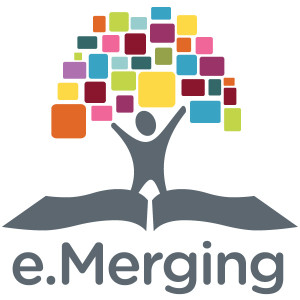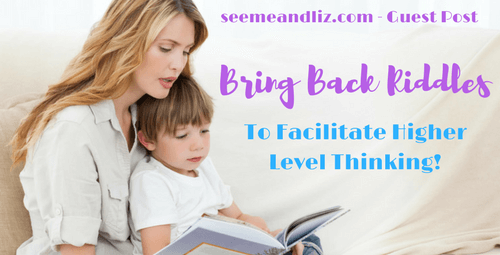
Riddles aren’t as prevalently enjoyed as they use to be.
I remember being excited to read the cereal box for riddles, hunting down the joke books at school to share with friends and giggling with my brothers when we created our funny puns.
However, now that I have my own children, I have realized that children don’t engage in riddles like they use to.
I asked my friend and teacher, Ms. Gray, if she noticed the same thing and she agreed.
She said that she stopped doing riddles because the kids didn’t understand them, often giving up immediately to hear the answer.
This is worrisome – riddles are much more than just for pleasure.
Riddles are a fun and age-appropriate way for children to play with language.
They are challenging word puzzles that develop important skills.
Benefits of Riddles For Children
♥ Teach children how to think or approach a problem
♥ Increase reasoning and logic skills
♥ Develop divergent thinking
♥ Boost attention
♥ Promote children’s’ abilities to view something from different perspectives
♥ Encourage flexible thinking
♥ Increase vocabulary
♥ Build reading comprehension skills such as point of view and making connections
♥ Build social relationships through humor
♥ Help children to initiate conversation and playful interaction
The playfulness of riddles make them intrinsically motivating, encouraging children to engage in learning without even realizing it.
Thinking Hard and Taking Risks
Another benefit of riddles is that they intentionally invite you to think hard.
This is important in a culture that is sheltering children from failure and saying it’s okay to give up when things get hard.
Riddles are brain exercise; they make your brain grow.
Telling this to my daughter helps her to visualize that not knowing an answer is a good thing, it forces you to think hard, which makes your brain stronger.
When solving a riddle, a person often makes a series of logical guesses in order to arrive at the correct answer.
Each guess is a risk. A child may think, “I might get this wrong but I’m gonna try.”
When a child gets the answer wrong, rather than simply getting the answer given to her, she is encouraged to use different skills to re-approach the problem.
In a sense, riddles encourage you to try again, not give up. This prepares children for embracing risk-taking in other social and academic learning activities.
Develop Life-Long (or strong) Readers
Riddles engage literacy in a variety of ways.
When children begin manipulating sounds, they are starting to understand that sounds and language are flexible; they can manipulate and play with it in song, nursery rhymes, and more.
This, in turn, helps with phonemic awareness.
Then, as children begin rhyming, they understand that words are silly and playful as Dr. Seuss shows us.
They can be enjoyed, made up, and can follow patterns.
As children become emergent readers and begin reading comprehension, riddles help them to develop skills such as questioning, point of view, and making connections.
These skills aren’t always easy to teach by the time children are reading. It’s important that children use use these skills in other contexts before they use them to read.
Above all, riddles are a natural way to build vocabulary. They encourage people to think of synonyms, antonyms, homophones and more.
Children can do this before they even know what those things are! Riddles involve synthesizing prior knowledge to recall information or make a logical guess to a correct answer.
This involves memory, another important skill to develop in order to make connections.
Lastly, our society values riddles.
For example, to become a lawyer, students have to take the LSAT, one of the most rigorous occupational exams.
A large portion of the LSAT is logic puzzles.
Riddles prime the brain for thinking logically and creatively so that children can solve mental puzzles.
How To Bring Back Riddles
- Talk to your children about the brain. That it’s a muscle that need exercise. Your brain gets stronger while we sleep and when we think, especially when we think hard. Sometimes thinking hard takes time.
x - Encourage children to be patient with they think and not to be discouraged when they don’t immediately know the answer. The process of thinking of an answer is growing their mind…Dinner time, bedtime and car rides are great times for riddles and other word challenges. Children have the time to think. They also engage their mind, unlike when they are using a toy or electronic. In our home the rule is no toys at the table and no electronics unless we are driving more than 3 hours. This is a challenge for the whole family!
x - Find good age appropriate riddles and jokes. Look for them online and in the library. Make up your own puns, silly rhymes, and games. One week we have the homophone challenge. The kids loved having a homophone pop into their head and then sharing it.
Great Riddle Books
The Everything Kids’ Giant Book of Jokes, Riddles, and Brain Teasers
Riddles and Trick Questions for Kids and Family
National Geographic Kids Just Joking: 300 Hilarious Jokes, Tricky Tongue Twisters, and Ridiculous Riddles
Author Bio
Bethany Todd and Laura Barr with e.Merging Education Consulting
Bethany is a mother of two and writer for e.Merging Educational Consulting. She has been working in the education field for 12 year, mostly as a kindergarten teacher, but also as a volunteer, coach, board member, and professional development presenter. With a masters in Elementary Education and a love for educating parents, she delights in sharing practical advice with caretakers in order to create rich research-based environments for kids that promote curiosity, creativity and a love of learning.
Laura is the owner and founder of e.Merging Educational Consulting. She has been working with families in the Denver area for over 20 years as a preschool and elementary educator, admissions director, parent educator, and educational consultant. Her educational background includes a Master of Arts in Early Childhood Education and certifications in educational advocacy and Love and Logic facilitation. Laura is a certified member of the American Institute of Certified Educational Planners. She is also a professional member of the Independent Education Consultants Association.
Visit our blog at e.Mergingconsulting.com/blog and check out our services in Denver.








I taught for 50 years and have been riddling for 20. I’ve done riddles with hundreds of students of all ages. Pomegranate Publications publish 2 packs of my riddles,(sold over 30,000!) and my new collection, “Ridds for Kids” – nature riddles with photo clues, is on Amazon as ebooks and is about to be released as a physical book.
Here are 2 riddles: I fall and I fall and I fall and I stay where I am. (Waterfall) If you look at me I remain as I am/If you hold me I return to what I was.(Ice or snow)
What you say about kids and riddles is very true. My 7 year-old granddaughter Jayla loves my riddles and is writing her own riddle book.